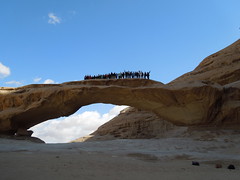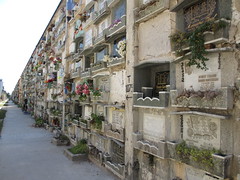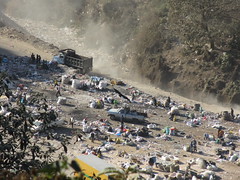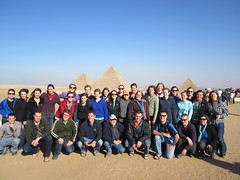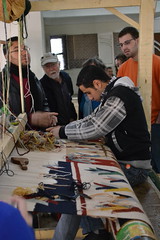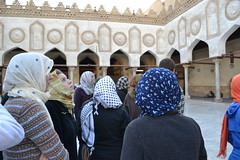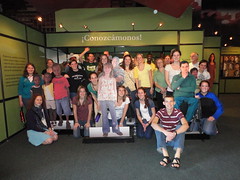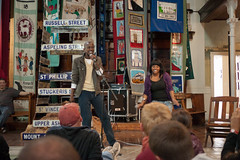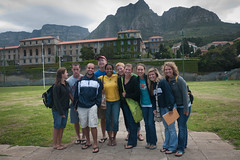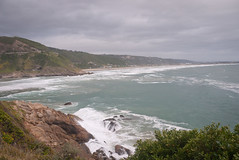Mount Sinai and St. Catharine’s Monastery
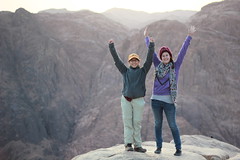 After our experiences in Egypt, we took the bus eight hours into the desert, following the path of the Israelites out of Egypt. Once over the Suez Canal (or under, as we traveled through a tunnel underneath) we were in Asia! Egypt technically controls the Sinai after Israel withdrew in 1979, but they are not allowed to build up their military there. As a result, Egypt has a hard time controlling Bedouin aggression in the region. Apparently one of these areas of unrest is the fastest route to Mount Sinai, so our tour bus company thus took us the long way around. We went almost to Jordan, then back to the center of the peninsula to visit St. Catharine’s Monastery and Mt. Sinai.
After our experiences in Egypt, we took the bus eight hours into the desert, following the path of the Israelites out of Egypt. Once over the Suez Canal (or under, as we traveled through a tunnel underneath) we were in Asia! Egypt technically controls the Sinai after Israel withdrew in 1979, but they are not allowed to build up their military there. As a result, Egypt has a hard time controlling Bedouin aggression in the region. Apparently one of these areas of unrest is the fastest route to Mount Sinai, so our tour bus company thus took us the long way around. We went almost to Jordan, then back to the center of the peninsula to visit St. Catharine’s Monastery and Mt. Sinai.
St. Catharine’s was a very neat experience. Two famous (albeit alleged) parts of the story of Moses reside at St. Catharine’s: the well, which Moses first drew from, and where he met his wife, and the burning bush from which God spoke to Moses. Like most biblical sites, nothing is 100% sure. In the case of the bush, there are a few things to consider. When Moses sees God in the bush, he was out shepherding his flock, which means at some point he would have come to the well to drink and “water the flock,” and thus, would have been near the well. According to our guide Samer, many attempts have been made to plant parts of the bush in other parts of the Sinai, but to no avail. I don’t know, but it seems that in some way the bush is special to that area.
The other notable thing about St. Catharine’s was their collection of ancient manuscripts and icons. They are the last remaining icons, the only ones which escaped the Roman icon burning spree. The old icons were beautiful and powerful, but what interested me were the old books. Perhaps the most amazing was one of the first copies of the Gospel of Jesus. So awesome to see actual evidence from that time period, further bolstering the belief that Jesus did actually exist. There were countless other books which exceeded my expectations: Old copies of Homer’s Iliad and Odyssey, for instance, and the book of Exodus, written in Latin. As Samer would say “simply amazing”.
We then had a packed lunch picnic style at a spot where the rock face looks like a calf… maybe the golden calf? All of the other guys and I had our lunch at the base of the calf. We then went back to St. Catharine’s to begin our long trek to the summit of Mt. Sinai. The climb to the top was intense. It took the frontrunners of the group about an hour and forty minutes to get to the top. Our legs were aching, and we were very tired, but gazing out upon the Sinai wilderness, the physical pain was worth it. It was stunning. And it really put the Israelites’ journey during Exodus into perspective. Looking at the mountains and landscape that they traveled through, you understand how the Israelites, who were not experienced nomads but slaves, needed God to survive. It was an amazing experience.
-David Everett
“Over our Heads, Your Flag is Waving in the Air”
January 21, 2012
Luxor, Egypt
We have had an amazing time in Egypt, getting 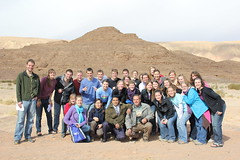 to know the people and listening to their stories. Today we got to know a lot about our tour guide, Samer (Sam). He is a man of humor and carries a sense of calmness with him at all times. Upon our arrival to Egypt we met Samer and each girl received a beautiful rose. This wonderful bit of kindness was only a glimpse of how he would continue to care for us.
to know the people and listening to their stories. Today we got to know a lot about our tour guide, Samer (Sam). He is a man of humor and carries a sense of calmness with him at all times. Upon our arrival to Egypt we met Samer and each girl received a beautiful rose. This wonderful bit of kindness was only a glimpse of how he would continue to care for us.
One night at dinner we were able to get insight to his life not only as an Egyptian in this momentous time period but also as a Coptic Christian (one of the largest Christian churches in Egypt) in an Islamic dominated country. We asked him if he was nervous or concerned about the parliament being 70% Muslim brotherhood and 20% considering converting to the Muslim brotherhood (if this situation were to occur, this would be the biggest majority in parliament since Hitler came into power in Germany according to Bishop Thomas).
Samer then responded in a very calm voice, “No, God still exists” and we were left “carrying the shock” (a phrase Samer often used to explain something fascinating or shocking). It was amazing how he responded with a simple phrase, but it felt so profound, “God still exists.” He continued to tell us about what the Coptic churches were doing during this time. After a church was bombed many Christian churches fasted together for three days. Samer told us that through these actions (and the churches actions) he felt “something good is going to happen.” Again, we were stunned. To have such confidence and strength at a time where things are seemingly falling apart was so greatly encouraging.
Petra, Jordan
A week has gone by since our enlightening conversation with Samer, and now that we have moved on to Jordan, we think back to our time we spent with Samer in Egypt. Three days ago we not only said goodbye to Egypt but also to Sam. We had a small farewell party for Samer and our group wrote a song for Samer.
Over our heads , your flag is waving in the air (2x)
There must be Samer somewhere
Oh, when we’re at the pyramids,
We hear “Lotus” in the air
Oh, when we’re at the temple
We hear “Lotus” in the air
Oh, when we’re in Alexandria
We hear “Lotus” in the air
There must be Samer somewhere
Oh, When we’re lost in Egypt
We know Sam will be there
Oh, when we’re tired and hungry
WE know Sam will be there
And, when we have a tour guide
We know no one can compare
We will really miss Samer
Over our heads, your flag is waving in the air (2x)
We will really miss Samer
We also were left behind with quotes that Sam often said throughout our tour and time spent with him that we would like to share with you all – that we will never forget!
Carry your shock – shocking or fascinating
Lotus – our group name he would holler with his Egyptian flag waving to round us up
Hip-Hip Hooray – at Janelle’s birthday party, Sam had us scream that!
Shall we go to the coach now (Let’s go to the bus)
-Taylor Gray Harrison and Rebekah Maldonado-Nofziger (with small notes made by Kat Pence)
